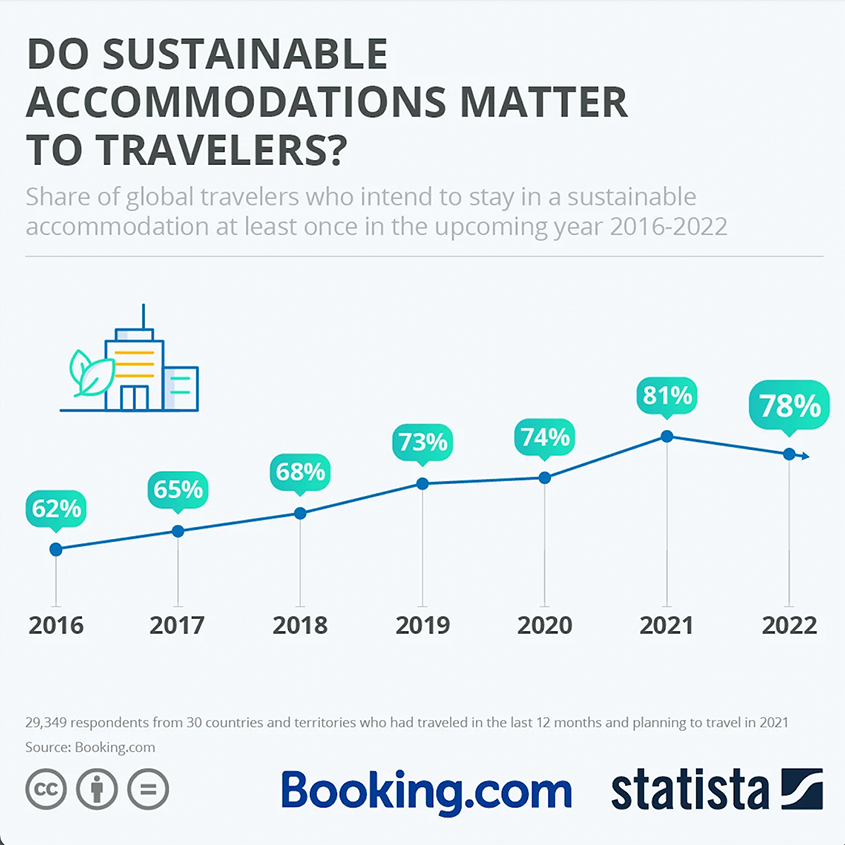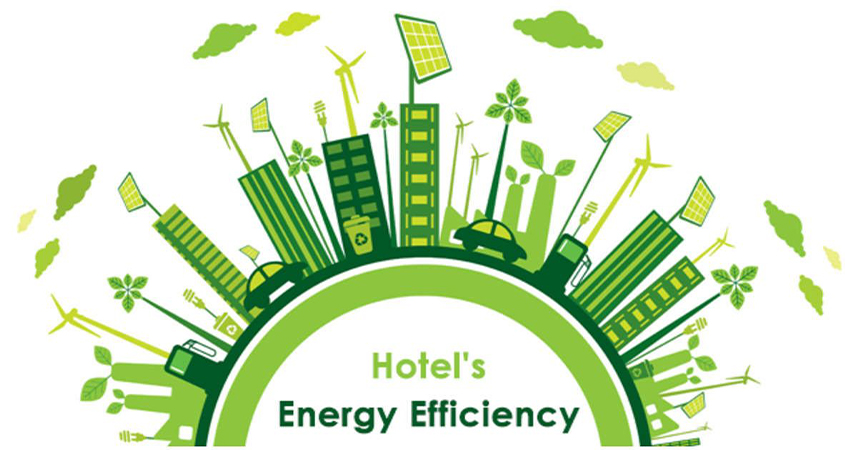Energy efficiency in the Hospitality Industry has become a top priority in recent years as they aim to reduce operating costs, minimise environmental impact, and meet guest expectations for sustainable practices. This trend is primarily motivated by increasing awareness of environmental concerns and a collective aspiration to contribute to sustainability efforts.
Drivers of Energy Efficiency Adoption in Hospitality
The adoption of energy efficiency in hospitality is influenced by several drivers, including:
1. Rising energy emissions
The operations of the hospitality sector frequently have a significant environmental impact, involving considerable energy usage, water consumption, and waste production. According to the Sustainable Hospitality Alliance, hotels alone contribute to around 1% of the world’s carbon dioxide emissions. Hotels accounted for approximately 363 million tons of the 36.3 billion tons of carbon dioxide emitted globally in 2021, roughly equivalent to the annual energy consumption of approximately 45.7 million homes, according to IEA analysis.
In Vietnam, as the demand for hotel services continues to surge, the hospitality industry has emerged as a significant consumer of energy, water, and other natural resources. Transitioning this sector towards environmentally sustainable practices is not merely a strategic business decision or a matter of economic calculations; it is an imperative necessity to protect future generations from the catastrophic consequences of flooding and climate change. Alarming estimates from the Vietnam Ministry of Natural Resources and Environment in 2020 indicate that a staggering 50% of the Mekong Delta region is vulnerable to flooding, while a concerning 17.2% of Ho Chi Minh City’s area faces the risk of inundation. With the hospitality industry contributing a substantial 5% to global CO2 emissions, this sector bears a profound responsibility to implement robust measures that curb global warming and mitigate the escalating climate crisis. Failure to act decisively could have devastating implications for Vietnam’s future.
As awareness about climate change and dwindling resources increases, stakeholders in the hospitality industry are increasingly acknowledging the pressing necessity to embrace sustainable practices. Adopting energy efficiency and eco-friendly practices yields dividends that extend beyond environmental preservation, concurrently unlocking substantial cost-saving opportunities over the long run. By seamlessly integrating strategies such as energy-efficient illumination solutions, water conservation systems, and waste reduction initiatives, hotels can curtail operational expenditures while simultaneously minimising their ecological footprint.
2. Environmental consciousness
Over the years, there has been a growing trend among travellers to choose sustainable hotels and resorts. Travellers are now better informed and discerning, often seeking accommodations that reflect their commitment to environmental preservation.
According to a study conducted by Booking.com, a prominent online travel agency, in 2023 76% of travellers expressed a greater inclination to book a hotel with a green certification. Additionally, the research found that 43% of travellers are willing to pay more for accommodations that prioritise sustainability. This deliberate decision-making underscores a shift towards sustainability that is reshaping the hospitality industry.

3. Regulatory pressures
Investors are increasingly integrating environmental, social, and governance (ESG) criteria into their decision-making processes, prompting businesses to prioritise sustainability efforts.
Furthermore, companies with strong sustainability initiatives are in a better position to navigate regulatory challenges and ensure compliance with laws. The hospitality industry, like many others, is confronted with an increasing wave of environmental regulations and standards aimed at achieving net-zero emissions. Embracing environmentally friendly practices not only aligns the Hospitality Industry with these evolving regulations but also protects it from potential penalties.
Consequently, the Hospitality Sector is embracing energy-efficient technologies and strategies at an accelerating pace to remain competitive and future-proof their operations.
The Influence of Energy Efficiency on Guest Satisfaction
Within the Hospitality Industry, energy efficiency extends far beyond a buzzword; it represents a pivotal element that substantially sways guest satisfaction. When hotels prioritise sustainable practices and channel resources into energy-saving measures, they not only contribute to the mitigation of carbon emissions but also elevate the overall guest experience to new heights.
Implementing energy management systems in hospitality environments guarantees guests a personalised and comfortable experience while minimising unnecessary energy usage. For example, adjusting smart HVAC systems and lighting controls based on occupancy and preferences ensures that rooms maintain optimal temperature and lighting levels at all times. This meticulous attention to detail not only curbs energy consumption within the hospitality realm but also leaves a durable impression on guests. It serves as a catalyst for crafting memorable and sustainable experiences, increasing the likelihood of guests returning or recommending the hotel to others.
At its core, by placing a coordinated emphasis on energy efficiency, hotels can attain a mutually beneficial outcome: catalysing sustainability initiatives while concurrently amplifying guest contentment.

3 Easy Steps to Jumpstart Your Hotel’s Energy Savings
Starting the quest for energy efficiency savings in the hospitality sector doesn’t have to be intimidating. By implementing a few straightforward measures, your hotel can greatly diminish energy usage and set the stage for a more sustainable future. Let’s take a look at the following 3 steps:
- First and foremost, contemplate performing an energy assessment. This step will pinpoint areas of energy wastage and reveal avenues for enhancement. Subsequently, an investment in energy-efficient appliances and lighting can yield significant benefits. For instance, LED lights not only use less energy but also have an extended lifespan, resulting in reduced energy expenses and maintenance.
- Another effective step is to adopt smart technology. For example, an Energy Management System (EMS) can automatically regulate heating, ventilation, air conditioning (HVAC) and lighting according to occupancy levels, significantly reducing energy consumption while maintaining guest comfort. Integrating an Energy Management System in the hospitality sector can also offer real-time data and insights, enabling better-informed decisions regarding energy utilisation.
- Involving your guests and employees in your sustainability initiatives is also a crucial step. Basic initiatives such as promoting the reuse of towels and linens among guests can lead to substantial energy savings in the hospitality sector by decreasing the need for frequent laundry cycles.

Energy Efficiency: An Intelligent Solution in the Hospitality Industry
As we gaze into the future of Hospitality, it becomes evident that sustainability, efficiency, and a guest-centric approach are not merely passing fads but crucial elements that will shape the industry’s landscape. At Vinergy, we recognize that the road to a sustainable future in hospitality is built upon the foundation of Energy Efficiency.
Pioneering energy management in the Hospitality Sector plays a pivotal role in driving this transformative shift. By leveraging smart technologies and its IoT SaaS platform, Vinergy stands ready to accompany you on the journey to monitor and conserve energy consumption, delivering a highly personalized and comfortable experience for guests, all while achieving a substantial reduction in environmental impact.
Vinergy’s platform and services metamorphose a hotel into a more intelligent, eco-friendly and efficient operation, simultaneously enriching the guest experience and augmenting energy efficiency. It goes beyond just conserving energy; it enhances the overall hotel experience. Don’t hesitate to get in touch with us; we’re always here to assist you!
